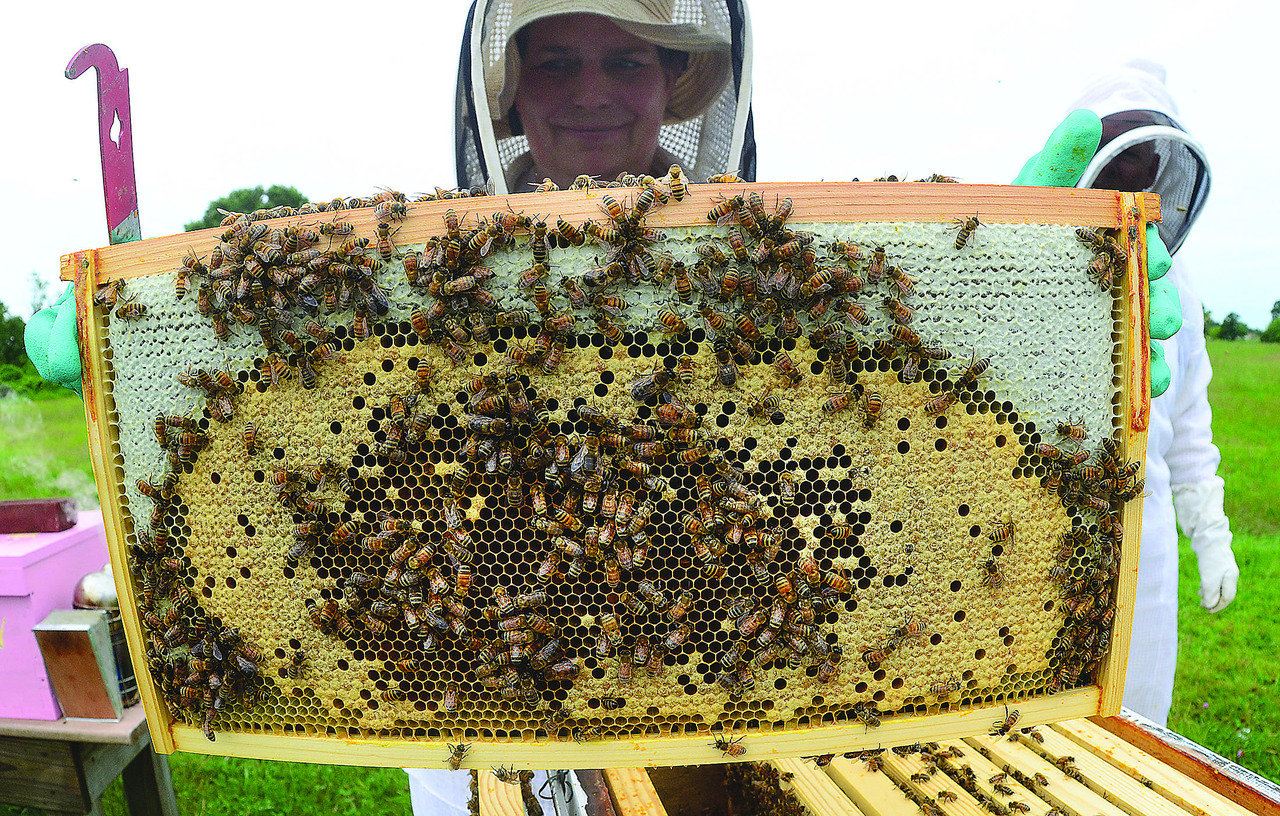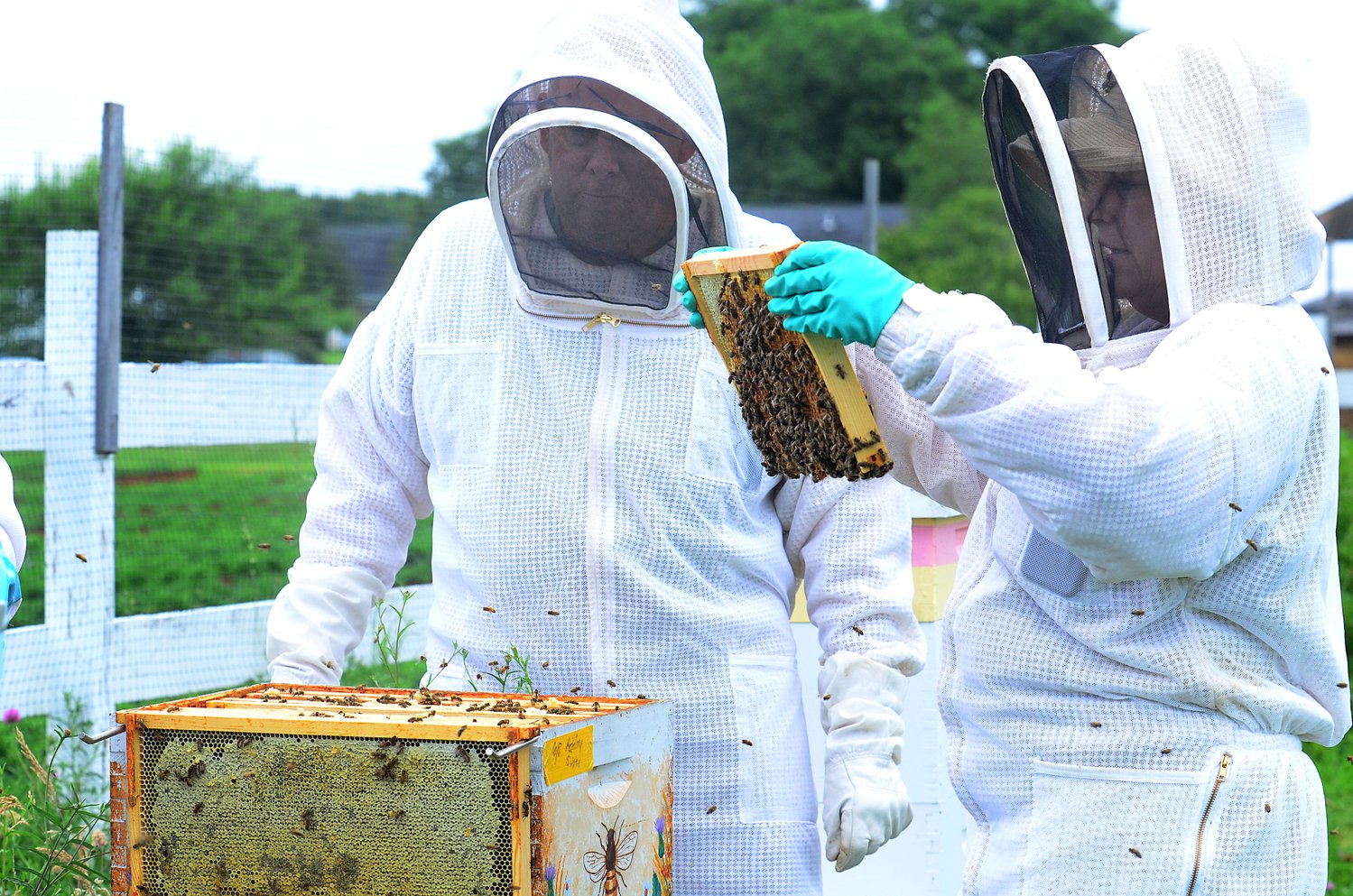Amateur apiarists have established their own colony at Frerichs Farm
Early last Friday morning, before temperatures started to climb, a small but dedicated group of beekeepers gathered at Frerichs Farm in Warren to check on the status of their charges. Dave Frerichs, …
This item is available in full to subscribers.
Please log in to continue |
Register to post eventsIf you'd like to post an event to our calendar, you can create a free account by clicking here. Note that free accounts do not have access to our subscriber-only content. |
Day pass subscribers
Are you a day pass subscriber who needs to log in? Click here to continue.
Amateur apiarists have established their own colony at Frerichs Farm
Early last Friday morning, before temperatures started to climb, a small but dedicated group of beekeepers gathered at Frerichs Farm in Warren to check on the status of their charges. Dave Frerichs, Jennifer Bristol, and Jayne Devol are all beekeepers who have joined together to build an apiary at Frerichs that can serve to protect honeybees while educating the public — and of course, get some honey.
There are several other beekeepers working with this core group, (though they were on vacation on this day.) "We all became almost like a club," said Mr. Frerichs. "It's been great."
Each tends their own hives but also helps with the others. "Jayne has hives in Bristol and Touisset. I have hives at Frerichs and one on the Brown property (in Bristol) where I live," said Ms. Bristol "Next spring we hope to build a pollinator garden in the Frerichs field that also has a Honey House."
This sort of communal collaboration and work is common among beekeepers, whose hobby instantly links them to a cohesive and growing community of hobbyists.
"Just when you think you've learned it all, and you've got it, you realize you don't got it," said Ms. Bristol. "Everyone does it differently, and everyone helps."
According to the Audubon society of Rhode Island, there are approximately 3,500 species of bees found in the U.S. and Canada, with 770 species in eastern North America, but there is not an accurate estimate of bee populations in Rhode Island. There were 183 species documented in Rhode Island as of the spring of 2016, but experts think a complete inventory could possibly double that number.
Honey bees are social insects that live in colonies consisting of a queen, the largest bee in the colony, and the only female that lays eggs. The drones are males which mate with the queen, while the workers are females that functionally run the colony, from feeding the brood, caring for the queen, building beeswax comb, guarding and ventilating the hive, cleaning and repairing the comb, removing debris from the hive, and foraging for nectar, pollen and water.
While the bees keep things pretty well in hand, for the purposes of domestication and honey collection, a little human management goes a long way. The beekeepers at the Frerichs apiary come though every 10 days or so, checking frames, making sure the bees aren't too crowded, they are building comb, and not overrun with mites, a constant problem.
If a hive is overcrowded, beekeepers will move a frame out; if it's not building fast enough, they might move a frame from a successful colony in. You also want to make sure the queen is doing her job: laying eggs. "It's mind-boggling how many eggs a good queen can lay in a day," said Mr. Frerichs. With queens reaching maturity at 16 days, workers at 21 days, and drones at 26 days, it doesn't take long to build a thriving community.
"It's about 1500 eggs a day," said Ms. Devol. "What the bees do, their social order, it's amazing.
"I'm amazed at how they build. They're little architects."
"You start out thinking you're doing it for the honey, then you realize you like them, and you really want to keep them alive," said Ms. Bristol.
Beekeeeping dates back more than 6,000 years, and was introduced in the New World in the early 1700's with the arrival of English settlers. In recent years it has enjoyed a resurgence in popularity, recognized as an important sustainability trend, as honey bee losses due to mites, overwintering, pesticides and colony collapse have cut the numbers of managed colonies in half over the past 3 decades. "Urban" beekeeping has even taken hold, with hobbyists in cities establishing rooftop colonies.
"You definitely want to be careful not to squish anyone," said Mr. Frerichs, sliding a frame back into place. "Especially a good queen."
"It happens," said Ms. Devol. But like with most other aspects of colony life, the bees deal with it. "They will know within hours if they don'y have a queen, and will identify a worker larvae, and feed it royal jelly," which is a bee secretion used to nourish larvae, as well as adult queens.
"I think the heart of the story is Dave and Barbara Frerichs who opened up their land for this," said Ms. Bristol. "They didn’t need more work. But they are farmers, conservationists and community-minded folks.
According to Ms. Bristol, the bee program began at about the same time the Frerichs lost their son David, 40, an educator who died by suicide in April of last year. "They could have said 'leave us alone'," Ms. Bristol said. But they didn't.
"While it was I who was interested in setting up hives, they co-invested and they are active beekeepers. Other beekeepers like Jayne join us to share knowledge….but much of our inspiration comes from the Frerichs themselves."
The Frerichs team plans to have their honey harvested and for sale in time for their fall Pumpkin Palooza, with proceeds going to the scholarship fund that Dave and Barbara have established in David's memory.









